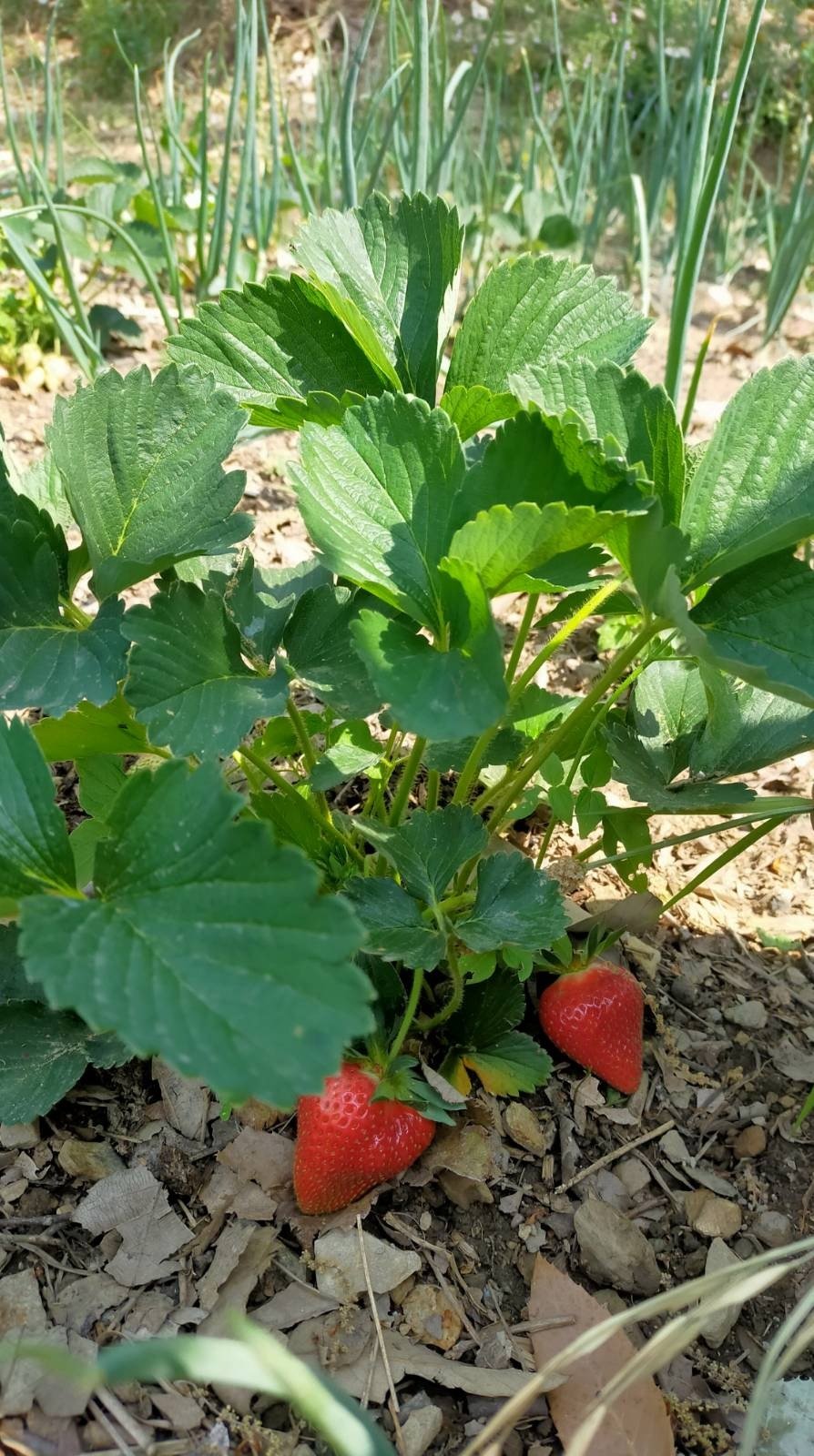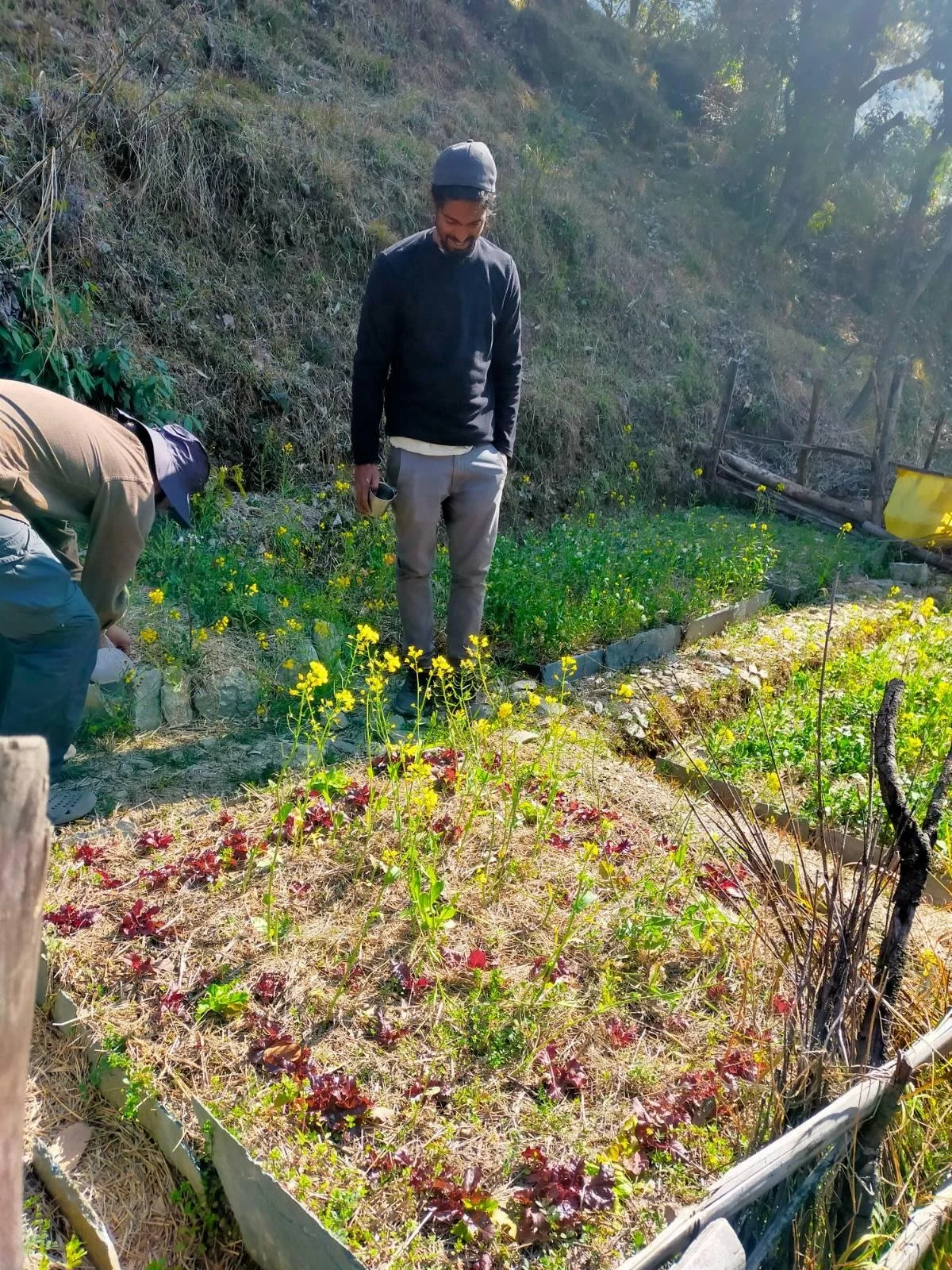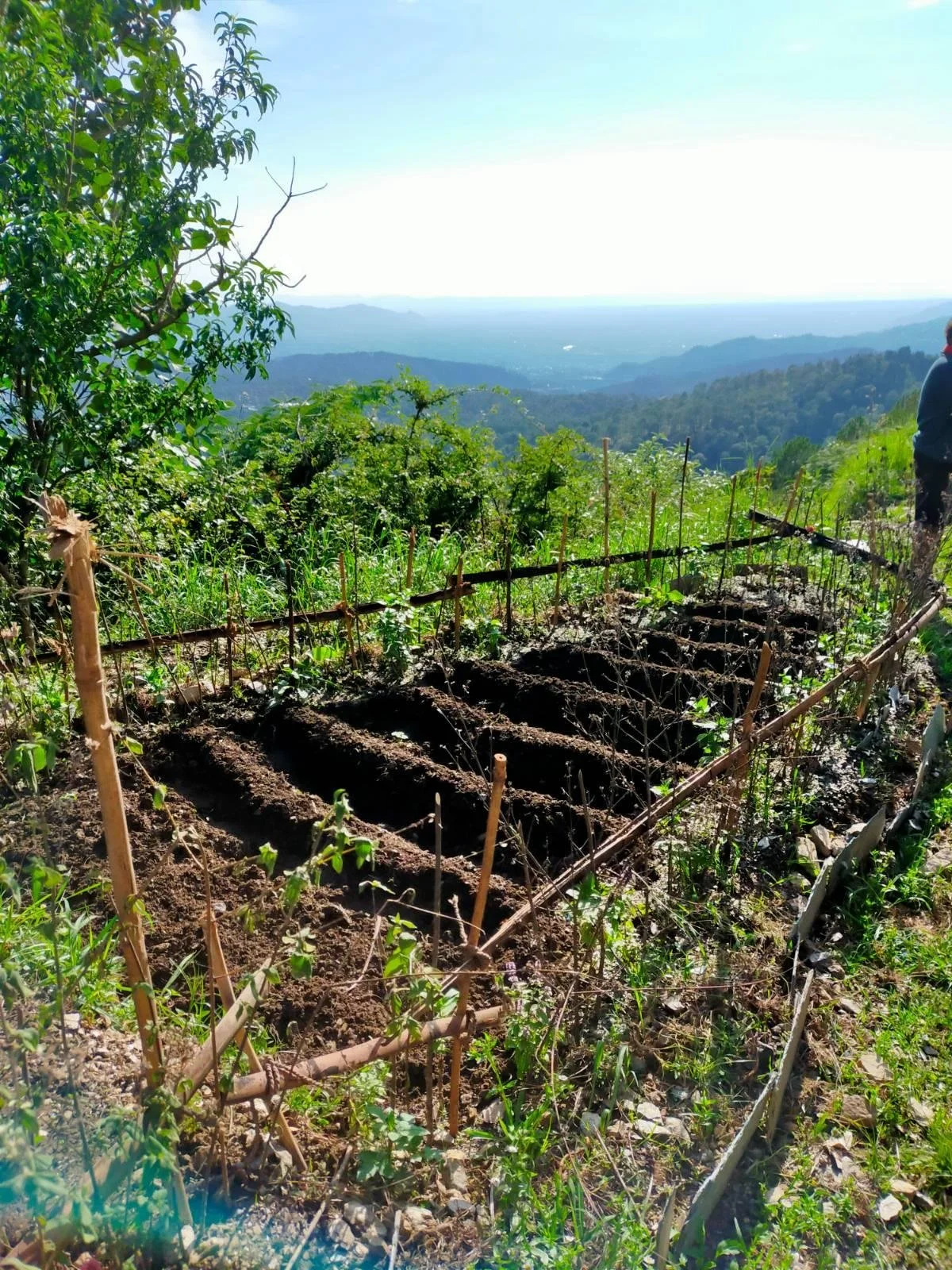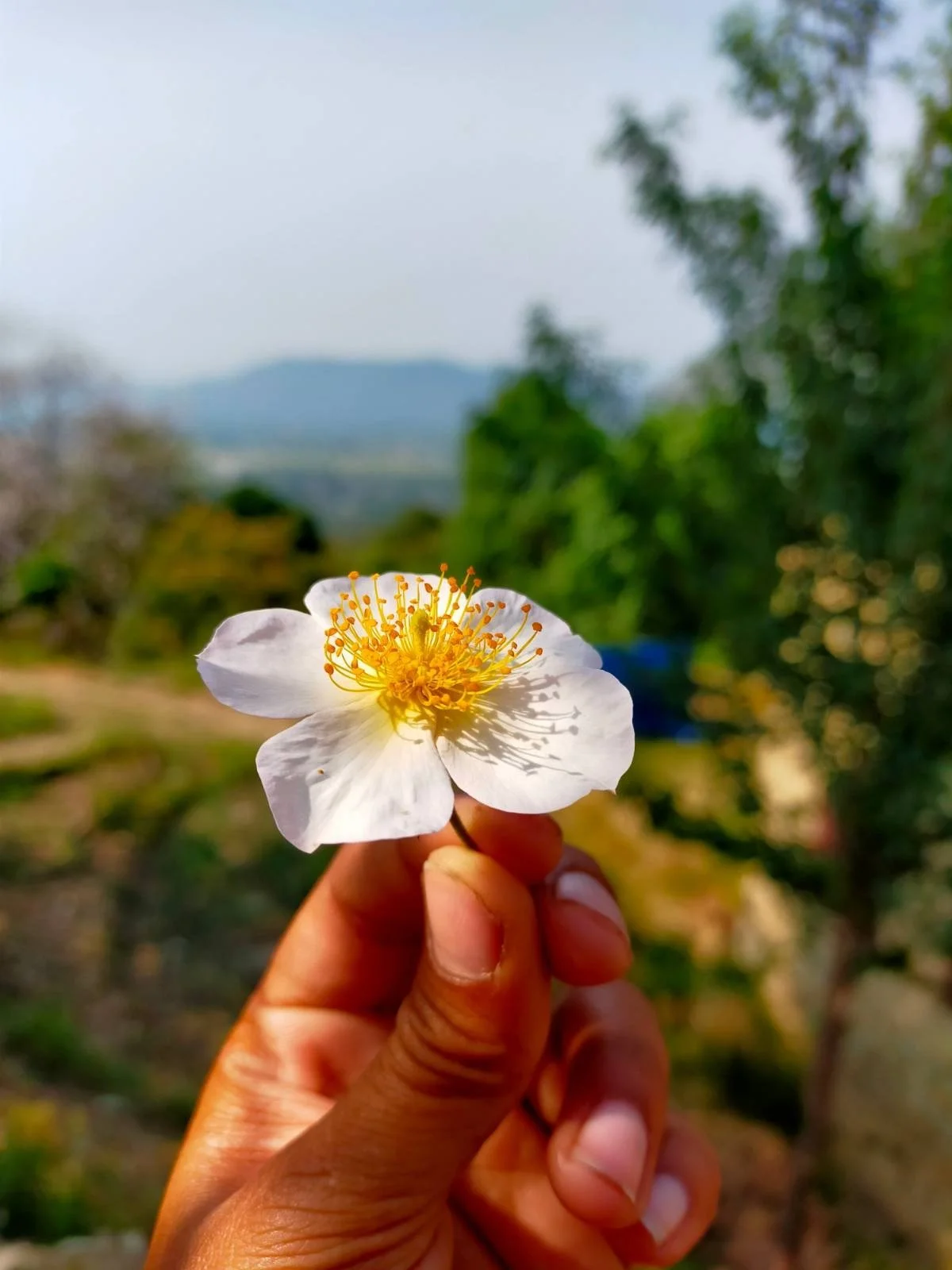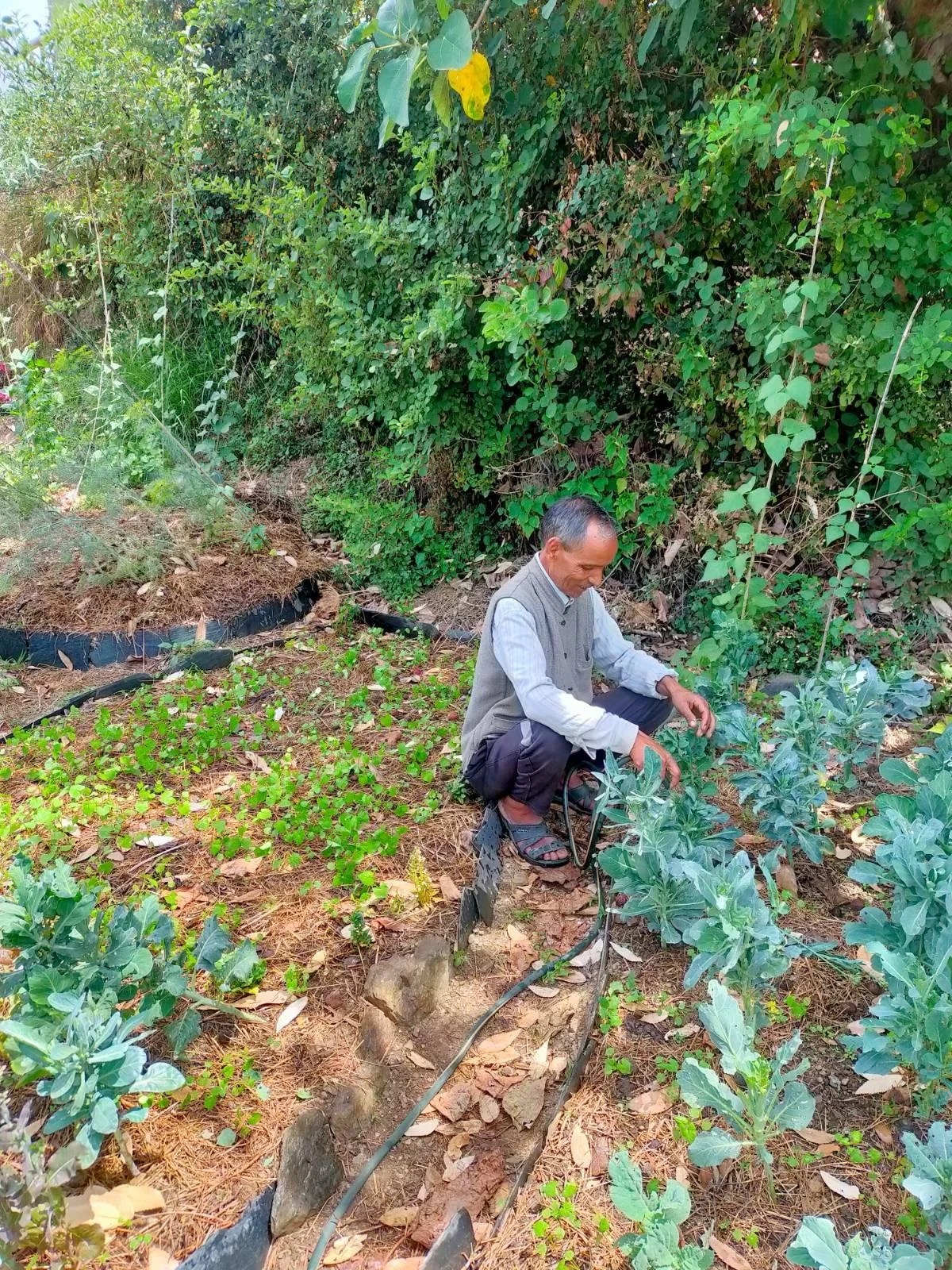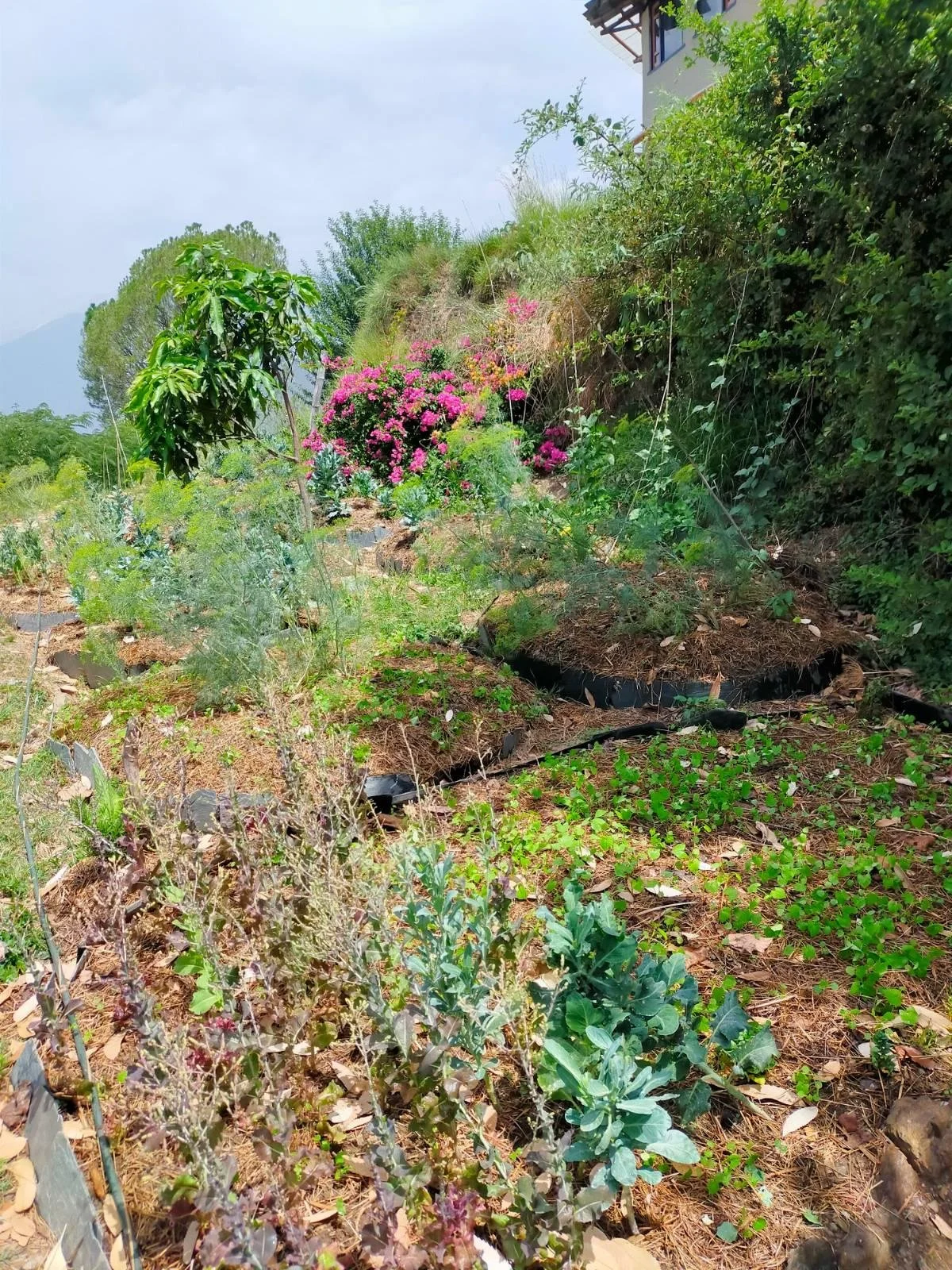We are pleased to invite you to join us for a four-week immersive service-learning programme providing opportunities to explore natural garden design and permaculture principles and practices.
The practical focus will be on hands-on work in Dharmalaya Institute’s beautiful organic gardens, supported by a healthy lifestyle with time for daily contemplative practice (e.g. yoga, meditation).
This programme also provides precious opportunities and support to understand ourselves and others better, to improve our communication and collaboration skills, and to bring out the best in ourselves.
Overview
Programme Type: Immersive residential service-learning programme
Topic: Permaculture and organic garden design
Dates: 6 March – 1 April 2023 (minimum commitment 4 weeks, followed by optional two-week practicum period)
Language: English (plus some site work in Hindi, with translation if needed)
Facilitators: On-site facilitation by Pushkar Khare, Surya Nimmagadda, and Dharmalaya Institute’s long-term students and volunteers
Requirements: All participants must have received at least two doses of an approved COVID-19 vaccine.
What is permaculture?
The world ‘permaculture’ is a relatively new term that brings together some of our world’s oldest and most time-tested ideas about sensible and sustainable ways to design and manage human habitats in harmony with nature.
The permaculture approach seeks to understand the interconnectedness of everyone and everything in nature, all as living systems within larger living systems, and to design our homes, our gardens, our communities and ourselves accordingly, to support optimum flourishing of people and the planet with minimum use of resources.
Some people think of permaculture as an advanced approach to natural food-growing — and it is that, to be sure, but it is also so much more.
Permaculture is a philosophy of working with, rather than against nature; of protracted and thoughtful observation rather than protracted and thoughtless labour; and of looking at plants and animals in all their functions, rather than treating any area as a single product system."
— Bill Mollison
In short, to explore permaculture is to explore insightful and creative solutions for greater health, ecological sensitivity, and harmony between all living things.
Primary topics & activities
Observation of nature: Learning to see nature more closely, in greater detail, and to recognize nature’s patterns
Introduction to the main principles of permaculture: natural systems, ecological and regenerative design, watersheds and water management, sustainable architecture and food-growing, efficient management of resources (stacking functions, etc.), and more
Hands-on training in organic gardening: creating a new garden bed, building a healthy soil, planting, mulching, watering, composting, traditional and modern practices, etc.
Introduction to garden design: siting a garden bed, companion planting, understanding a garden as a system within a system, good drainage, etc.
Campus life and the experience of living in community
Most of our past long-term participants tell us that experience of being a part of the Dharmalaya community, living and working together, is one of the best parts of the experience for them. We emphasize a culture of kindness and cooperation rather than selfishness and competition, and it’s great to live with kindred spirits in that kind of environment.
But, to be sure, this is also one of the most challenging aspects of a residential programme, because when we live together closely with other people for a long time, eventually challenges come up. This is actually a really great and precious thing if one embraces these experiences with a humble and sincere attitude, looking honestly at ourselves, wanting to learn and grow (instead of just wanting to be ‘right’). Dharmalaya maintains an environment in which everyone is supported to learn and grow in this way, and this kind of learning truly changes lives for the better, because few lessons are more valuable than those that help us understand ourselves and others better and learn to relate with others more sensitively and skilfully.
So one thing to understand is that learning to be a healthy part of a healthy community is one of the most important aspects of all of our residential programmes — and of compassionate living more generally — so that kind of inner work and social evolution should be something that appeals to you strongly if you’re thinking of applying for this programme. We’ll be spending a lot of time talking about it and asking you to self-reflect, journal, and share with others about your experiences, which benefits everyone.
Programme structure
1. Orientation
During the initial seven-day orientation period, participants will enjoy a structured daily programme designed to help you rest and recover while gently wading into the Dharmalaya life and key concepts of the programme. Below you’ll find an overview of the main activities for the orientation period.
DAILY ASSIGNMENTS
During the orientation week, participants will have one of each of the following types of assignments to complete each day, and time in the schedule allotted for them.
Reading assignment, followed by short topical response (written or discussion)
Reflection & journaling: a different topic assigned each day
The topics for these assignments will be related to the various interrelated topics of the programme, including permaculture philosophy, gardening practices, and sustainability.
You will also get your first exposure to the hands-on work in the gardens during this first week, including training in how to use the tools, etc.
2. Training & practice
Activities during the training and practice phase (the majority of the programme) will include:
Hands-on work with sustainability projects on the Dharmalaya campus, which may include organic gardening, permaculture landscaping, and other related activities. Typically about seven hours of hands-on work each day (except Sundays, which are for food preparation, personal reflection time and rest).
Presentations and discussions to take us deeper into the core concepts of the programme.
Special sessions and assignments as may be announced from time to time.
Yoga and meditation: The programme schedule includes time for daily practice of yoga and meditation, which are proven to be supportive for health and well-being, and also conducive to learning and joy. If you already have a yoga and/or meditation practice that works well for you, you’re welcome to keep doing your own practice in our beautiful hall during the morning practice time before breakfast. (For those who do not have their own practice already, it may be possible to arrange some basic instruction, depending on circumstances at the time.)
Who is this programme for?
This programme is open to anyone wishing to:
Make an in-depth, interdisciplinary exploration of compassionate living and caring community.
Practice sustainability skills such as natural building, organic gardening and more.
Be a part of a small, intimate group of kindred spirits collaborating in service.
Reflect honestly on your outer and inner life, with the intention to learn and grow.
Experience well-being through simple, healthy living and daily contemplative practice in an ashram-style environment.
Remain safely within our Himalayan eco-campus for the entire duration of them programme (without visiting town, etc.).
Qualities that the ideal candidates should have:
Sensitive and respectful to the experience and needs of others
Generous spirit: sincerely wanting to give even more than you receive
Team player, agreeable and cooperative, happy to do whatever is needed
Self-motivated to work and excel (not needing too much urging by others)
Honest with both self and others, putting integrity first
Motivated to improve oneself and takes constructive feedback well, with gratitude
What to expect
Two of the keys to happiness are: (1) to have realistic expectations to begin with; and (2) not to be too attached to those expectations, but rather to stay flexible as life unfolds. Both of these keys to happiness will be especially useful during this unusual period, when the pandemic often impacts life and work in unexpected ways. So, with that in mind, here are some of the things participants should expect (while remembering to keep a flexible attitude):
Full-time programme focus: This programme is called ‘immersive’ because the point is to be completely focused on the programme. While there will be some time for rest, reading/journaling, and personal reflection, there won’t be time for pursuing other activities unrelated to the programme. While you’re here, the expectation is that your full attention will be focused on the programme experience from start to finish.
Plenty of physical work: Most of the work to be done is physical, and some of it requires physical endurance, so it’s best to be prepared both physically and psychologically for a lot of hard work. One key to happiness here is to keep a very positive and enthusiastic attitude about the work, knowing that you’re making the world a better place in a small way, which makes it a joy.
Supportive routine: A daily rhythm of contemplative practice, outdoor activities, discussions, and silent meditation time.
Natural simplicity: Rustic accommodations in natural earthen buildings or comfortable tents in a beautiful forest setting.
Yogic lifestyle: Clean and simple ashram-style lifestyle in which everyone contributes to the running of the place, including cleaning, washing dishes, etc.
Healthy food: Natural and mostly organic, purely vegetarian meals (100% plant-based, vegan). No junk food or packaged snacks, etc.
Digital detox: There will be no use of mobile phones or internet from 9-5 or during evening sessions so that everyone stays focused on the group tasks, and present with one another — and with our own experience. For those who are normally glued to your phones, it may take some adjustment at first but soon you’ll be amazed how much better you feel engaging with nature and good work with good people rather than the screen.
Schedules & dates
Schedule: Start and end dates
The programme will begin at 11:00am on Day 1. All newly arriving participants will be required to arrive sometime between 9:30am and 10:30am on Day 1 itself (we will provide detailed timing, instructions, and travel tips after confirming your registration).
The programme will conclude at 2:30pm on the last day. Participants who are leaving after the programme should plan to depart between 2:45pm and 4:30pm.
Participants who completely programme successfully may apply to remain longer (with reduced fees starting after the end of the fourth month).
Schedule: What will the days be like?
Although the day-to-day schedule will vary a bit, the schedule for a typical day during this programme would more or less as follows:
6:00 Wake
6:30 Morning practice (yoga or your own meditation practice)
8:00 BREAKFAST
9:00 Morning work session (or learning activity)
12:30 LUNCH
1:30 Afternoon work session (or learning activity)
5:00 Personal time
6:00 DINNER
7:00 Evening activity or personal time (various depending on situation)
9:30 Lights out, silent time until breakfast
Tuition fee
Recognizing that our participants come from diverse backgrounds, we are providing a sliding scale with three tiers, to make it possible for everyone to donate according to their means.
Total fees for the four-week minimum commitment for the course (including tuition, shared accommodation, three meals daily, and tea, but exclusive of transportation to and from Dharmalaya Institute) are as follows:
Low standard rate: Rs 7500 per week (making Rs 30,000 total for four weeks), with a 5% full prepayment discount making Rs 28,500 total when prepaying in full for the four weeks (prepayments are non-refundable).
Subsidized rate (for those who can’t afford the standard rate): Rs 6000 per week (making Rs 24,000 total for four weeks), with a 5% full prepayment discount making Rs 22,800 total when prepaying in full for the four weeks (prepayments are non-refundable).
Supporter rate (for those who can afford to give more to support the villagers): Rs 45,000 total for four weeks.
We do not want cost to be a barrier to anyone’s participation, so if you have exceptional financial hardship and cannot afford even the lowest subsidized rate, you can contact us to let us know your situation and your needs.
OPTIONAL TWO-WEEK EXTENSION: STAY ON AS A VOLUNTEER AFTER THE PROGRAM ENDS
For those who might wish to gain additional experience by staying on as a volunteer after the formal programme ends on 1st April (subject to available space and acceptance of application), there would be an additional cost of Rs 750 per day for each day after 1st April (a total of Rs 10,500 for the full two-week extension).
POSSIBILITY FOR LONG-TERM VOLUNTEERING
For volunteers who stay beyond four months, there will be a reduced work-study rate of Rs 18,000 per month (including all meals and shared accommodation) beginning with your fifth month. And for those who stay six months or longer will qualify to apply for work-study scholarships to cover the full cost of your room and board, beginning in your seventh month.
Internship in Permaculture & Organic Gardening
For those with serious interest in developing your skills and knowledge related to permaculture and compassionate living, Dharmalaya Institute has a small number of openings for long-term internships (subject to available space and acceptance of application). For details, see this page.
About your facilitators
On-site facilitation by Pushkar Khare, Surya Nimmagadda, with additional guidance from Dharmalaya Institute’s local village staff.
Application process
STEP 1 — APPLY: Submit the application form here on our website and wait for our reply. We may email you to ask follow-up questions if necessary.
STEP 2 — INTERVIEW: If your application is selected for the shortlist, the next step will be for us to schedule a time to do an interview on a video call. During this interview, you’ll have the chance to ask whatever questions may be on your mind, and we’ll have a chance to get to know you a bit better. If necessary, there might be a second video interview for final candidates.
STEP 3 — ACCEPTANCE & DEPOSIT: If you are selected for the programme after your video interview, then at that time we will send you more detailed information about the programme and how to prepare for your time at Dharmalaya Institute. You will then have one week from the date of acceptance to make your nonrefundable deposit to hold your place in the programme. The minimum deposit is 50%, but it is also possible to prepay in full.
If you have any questions after reading all the material here on our website, feel free to contact us and we’ll be happy to address your questions.
We look forward to connecting with you!



